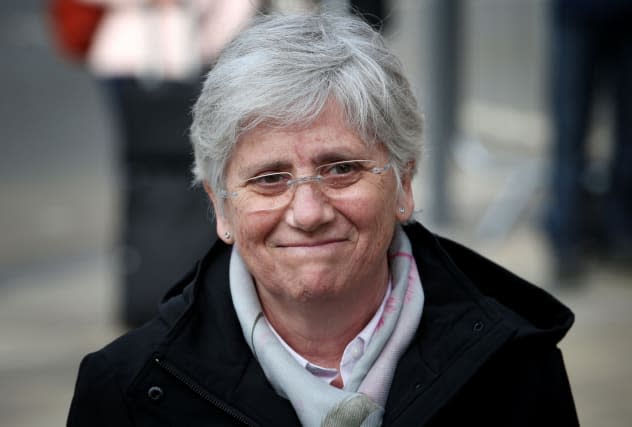Academic vows to fight Spanish extradition attempt

A former Catalan minister has described charges against her as politically motivated and "a grotesque distortion of the truth" as she embarked on a legal fight to avoid extradition to Spain.
Professor Clara Ponsati's lawyer spoke of her disbelief that she is "being held responsible" by the Spainish authorities for the violence that broke out on the day of Catalonia's controversial independence referendum last year.
Scotland-based Professor Ponsati, the ex-Catalan education minister, is being sought by the authorities in Madrid on charges of violent rebellion and misappropriation of public funds over her role in the 2017 vote.
She "robustly" denies the charges against her, contained in an extradition warrant from the Spanish Supreme Court, and does not consent to being extradited.
Clara Ponsati's lawyer @AamerAnwar gives a speech outside court on her behalf after the pro-Indy Catalan politician was granted bail
"Scotland you have been true friends to the people of Catalonia in their darkest hours" pic.twitter.com/kvGJJSOpMz
-- Conor Riordan (@conor___r) March 28, 2018
The academic was released on a bail on Wednesday after appearing from custody at a brief hearing at Edinburgh Sheriff Court, which came just hours after she handed herself in to Scottish police.
Speaking outside court, Prof Ponsati's lawyer Aamer Anwar said: "The 52-page warrant included the crimes of rebellion - punishable by up to 25 years in prison - as well as the crime of misappropriation of public funds, punishable with up to eight years' imprisonment.
"Clara wishes for me to state that these charges are politically motivated and a grotesque distortion of the truth. She cannot believe that she's being held responsible for the violence that took place on the day of the referendum.
"She believes that the Catalan people tried to express a democratic right to decide their own destiny and the only people that should be held responsible for the brutal violence was the Spanish police and the 6,000 state security forces who attacked the Catalan people on behalf of the Spanish Government.
"She submits that Spain has not followed due process, cannot guarantee the independence of the judiciary and has repeatedly abused the human rights of the Catalan people."
Thanku to the 100s of thousands who have supported @ClaraPonsati we have a long road ahead 'Scotland you have been a true friend to the people of #Catalonia' #DefendClarahttps://t.co/Lwi2rGLweGpic.twitter.com/D0RymeWgcV
-- Aamer Anwar (@AamerAnwar) March 28, 2018
Prof Ponsati attended St Leonard's police station in Edinburgh voluntarily on Wednesday morning after she was made the subject of a European arrest warrant last week.
She was placed under arrest and formally had the European Arrest Warrant read to her.
The subsequent court hearing before Sheriff Nigel Ross lasted less than 10 minutes, with a number of her supporters present in the packed court room and many more outside the building.
Advocate Claire Mitchell, for Prof Ponsati, told the court there will be a question raised over "the validity of the warrant".
The legal team is also expected to challenge whether the allegations are extradition offences and look at other "extraneous" considerations.
There may also be an argument that extradition is "disproportionate" and incompatible with her convention rights, the court was told.
Prof Ponsati was granted bail, which was not opposed by the Crown, and asked to surrender her passport.
Her case will return to court on April 12 for a preliminary hearing.
Please RT, share & contribute 2 my crowdfunder - Later on this morning I will attend police station with my lawyer @AamerAnwar & will b arrested & taken 2court as Spain tries 2extradite me, I need ur support #DefendClara#Catalonia?https://t.co/9wQKd4ZeW4 ... pic.twitter.com/TM0tL3t7mQ
-- Clara Ponsatí (@ClaraPonsati) March 28, 2018
Prof Ponsati returned to Scotland earlier in March, having been in Belgium since fleeing Spain with Catalonia's ex-leader Carles Puigdemont and three other former cabinet members, following an unsuccessful bid to declare independence from Spain in October.
She had resumed working at the University of St Andrews in Fife.
But a Spanish judge issued arrest warrants on Friday for Prof Ponsati and the other fugitive politicians including Mr Puigdemont, who was detained by police in Germany.
A crowdfunding drive to raise money for Prof Ponsati's extradition defence reached £100,000 just over two hours after it was launched on Wednesday morning.
Mr Anwar said: "The last few days have been difficult and Clara knows that there is a long road ahead. But she is truly humbled by the hundreds of thousands who have supported her, contributed to the legal fund and also wishes to thank the Scottish Government.
"Scotland, you have been true friends to the people of Catalonia in their darkest hours.
"Clara respects the fact that her fate now lies in the hands of Scotland's independent judicial system. This is what should happen in a democracy."


